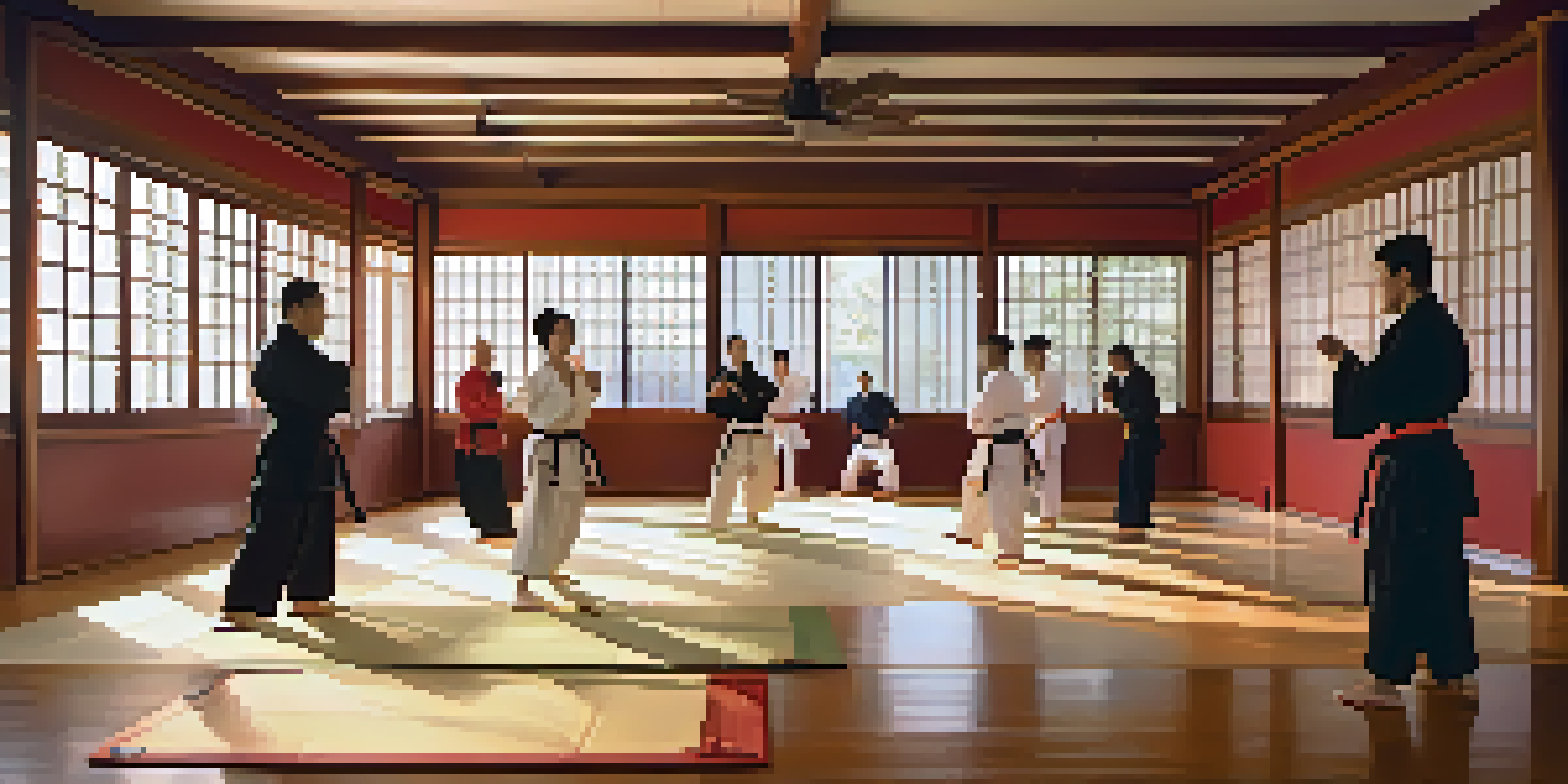The Positive Impact of Martial Arts on Mental Health

Martial Arts as a Stress Reliever
Martial arts provide an excellent outlet for stress relief. Engaging in physical activity helps release endorphins, the body's natural mood lifters. When you practice martial arts, you focus your mind and body on the movements, allowing daily worries to fade away. This mindful engagement can be a refreshing break from the chaos of everyday life.
Martial arts are a way of life. They teach discipline, focus, and respect, and they empower you to be the best version of yourself.
Additionally, the structured nature of martial arts training can create a sense of routine. Routines can be comforting, especially during times of uncertainty. Knowing that you will attend class and practice specific skills can provide stability in your life, which is particularly beneficial for mental health.
Moreover, the camaraderie found in martial arts studios fosters a supportive community. Sharing your challenges and victories with fellow practitioners can significantly reduce feelings of isolation, further alleviating stress and promoting a sense of belonging.
Building Confidence Through Martial Arts
One of the most significant benefits of martial arts is the boost in self-confidence it provides. As you learn and master new techniques, you develop a sense of accomplishment that can translate into other areas of life. This newfound confidence can empower individuals to tackle challenges outside the dojo, whether at work or in personal relationships.

Furthermore, martial arts often involve setting and achieving personal goals, such as earning new belts. This goal-oriented mindset encourages practitioners to push their limits and face their fears, ultimately reinforcing their self-worth. Each achievement, no matter how small, contributes to a stronger belief in one's abilities.
Stress Relief Through Martial Arts
Engaging in martial arts helps release endorphins and provides a structured routine that alleviates stress.
Lastly, martial arts teach valuable life skills such as discipline and perseverance. By consistently training and pushing through obstacles, individuals learn that they can overcome difficulties, fostering a resilient mindset that strengthens confidence.
Improving Focus and Concentration
Martial arts require intense focus and concentration, which can significantly enhance cognitive abilities. Practicing techniques and memorizing forms demands mental engagement, sharpening your attention span. This heightened focus can carry over into daily life, improving performance at work or school.
The greatest victory is that which requires no battle.
Moreover, the meditative aspects of martial arts, such as breathing techniques and mindfulness, promote mental clarity. These practices help calm the mind, allowing practitioners to concentrate better on tasks at hand. This is particularly beneficial for individuals struggling with anxiety or distractions.
Additionally, the discipline involved in martial arts training teaches individuals how to prioritize tasks effectively. Learning to balance training with other responsibilities encourages better organization skills, further enhancing focus and concentration in various aspects of life.
Enhancing Emotional Regulation Skills
Martial arts training often involves scenarios where practitioners must manage their emotions, particularly in sparring or competition. Learning to remain calm under pressure fosters emotional regulation, which is crucial for mental health. This ability to control emotions can help individuals handle stressful situations more effectively.
Furthermore, martial arts emphasize respect and humility, which can lead to healthier relationships with others. Understanding how to manage one's emotions also translates to greater empathy and patience in interpersonal interactions. This emotional intelligence can create a positive feedback loop, improving both personal and professional relationships.
Boosting Confidence and Discipline
Martial arts empower individuals by setting personal goals, fostering a sense of accomplishment, and teaching discipline.
In addition, martial arts encourage practitioners to express themselves physically, providing a healthy outlet for emotions. Instead of bottling up feelings, individuals can channel their emotions into their training, leading to a more balanced emotional state.
Fostering a Sense of Community
Joining a martial arts class creates an instant sense of community. The shared experience of training together fosters friendships and support networks, which are vital for mental well-being. This sense of belonging can be particularly important for those feeling isolated or disconnected in their lives.
Moreover, the encouragement found within martial arts studios can motivate individuals to push themselves further. Practitioners often celebrate each other's achievements, creating a positive environment that nurtures growth and resilience. This supportive atmosphere can significantly enhance one's mental health journey.
Additionally, many martial arts schools engage in community outreach or charity events. Participating in these activities strengthens the bonds within the community, providing practitioners with a sense of purpose and fulfillment beyond the dojo.
Promoting Mindfulness and Presence
Martial arts inherently promote mindfulness, as practitioners must stay present during training. This focus on the moment helps individuals develop greater awareness of their thoughts and feelings, which is essential for mental health. Practicing mindfulness can lead to reduced anxiety and increased emotional stability.
Furthermore, the physical nature of martial arts requires the body and mind to work in harmony. This connection encourages practitioners to listen to their bodies, fostering self-awareness and encouraging healthier habits. By understanding how physical movements impact mental states, individuals can make more informed choices in their daily lives.
Building a Supportive Community
Joining a martial arts class creates a sense of belonging, encouraging friendships and support networks that enhance mental well-being.
Lastly, the meditative aspects of martial arts, such as breathing techniques, further enhance mindfulness. Practicing these techniques can lead to a calmer mind, improved focus, and a greater sense of peace, which all contribute positively to mental well-being.
Encouraging Healthy Lifestyle Choices
Martial arts not only improve physical fitness but also encourage healthy lifestyle choices. Regular training promotes exercise, which is known to boost mood and reduce anxiety. As individuals commit to their martial arts practice, they often become more conscious of their overall health and wellness, leading to better lifestyle choices.
Additionally, martial arts training often involves discussions about nutrition and recovery. Many instructors emphasize the importance of fueling the body appropriately to support performance. This education about healthy eating habits can empower individuals to make better dietary choices, enhancing their physical and mental health.

Moreover, the discipline learned through martial arts can extend to other areas of life. As individuals adopt a more disciplined approach to training, they may also develop healthier routines in sleep, work, and social interactions, creating a well-rounded lifestyle that supports mental well-being.